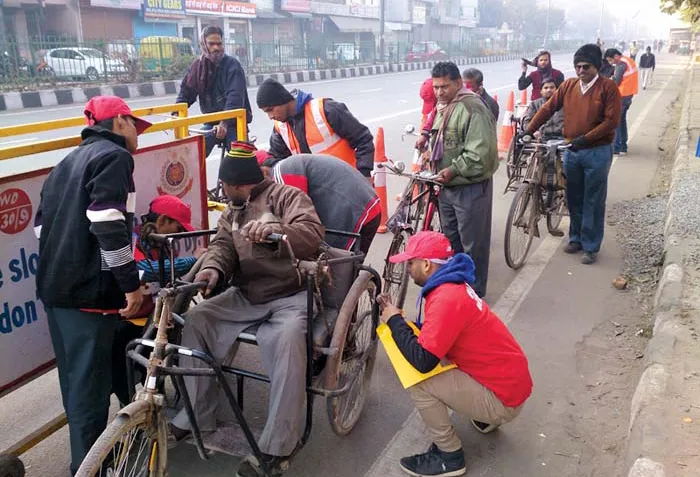A new campaign is calling on UK drivers to ‘sharpen up’ their act by getting their eyesight tested every two years to ensure their vision meets legal standards and they aren't putting people in danger. The campaign by road safety charity Brake, in association with the DVLA, insurer RSA and Specsavers, comes as new research shows many drivers are failing to ensure they can see properly on every journey. A survey of 1,000 UK drivers by Brake, RSA and Specsavers finds that a quarter of drivers (26%) haven't ha
August 5, 2013
Read time: 3 mins
A new campaign is calling on UK drivers to ‘sharpen up’ their act by getting their eyesight tested every two years to ensure their vision meets legal standards and they aren't putting people in danger.
The campaign by road safety charity3963 Brake, in association with the DVLA, insurer 6857 RSA and Specsavers, comes as new research shows many drivers are failing to ensure they can see properly on every journey.
A survey of 1,000 UK drivers by Brake, RSA and Specsavers finds that a quarter of drivers (26%) haven't had a vision test in the last two years. A worrying one in 11 (9%) admit not visiting the optician for five years or more, or never; for 3% it's been more than a decade; and 3% (the equivalent to more than one million UK drivers) have never been.
At the same time, many drivers who know they need glasses or lenses fail to wear them on every journey. Nearly one in 10 (9%) who need glasses or lenses don't always wear them when driving. Furthermore, of those who claimed they don't need glasses or lenses, one in three (32%) haven't had their eyes checked in the last two years, so can't be certain their vision is up to scratch.
Research published last year by the Road Safety Authority claims that failing to ensure your vision is good enough to drive is estimated to result in 2,900 road casualties a year, causing trauma and devastation to many victims.
To raise awareness among drivers about their responsibilities, the DVLA is launching an online education campaign.
Julie Townsend, deputy chief executive, Brake, said, "Being a driver is a huge responsibility, and means you need to look after your own health and fitness to drive as well as making sure your vehicle is roadworthy. If your vision isn't up to scratch you are posing an enormous risk on roads, as being able to see properly is fundamental to being a good driver. Your eyesight can deteriorate rapidly without you noticing, and at the wheel that can be lethal. That's why it is so important to get tested every two years and always wear glasses or lenses if you need them when driving.
Adrian Brown, CEO of RSA UK & Western Europe, said, "It's no wonder so many people aren't fit to drive when eye tests aren't required by law at any point once you've passed your driving test. Far more regular testing will mean safer, more responsible drivers and will be good for people's health in general too."
To find out more about the Brake ‘sharpen up’ campaign %$Linker:2 External <?xml version="1.0" encoding="utf-16"?><dictionary /> 0 0 0 oLinkExternal click here www.brake.org.uk false http://www.brake.org.uk/ false false %>.
The campaign by road safety charity
A survey of 1,000 UK drivers by Brake, RSA and Specsavers finds that a quarter of drivers (26%) haven't had a vision test in the last two years. A worrying one in 11 (9%) admit not visiting the optician for five years or more, or never; for 3% it's been more than a decade; and 3% (the equivalent to more than one million UK drivers) have never been.
At the same time, many drivers who know they need glasses or lenses fail to wear them on every journey. Nearly one in 10 (9%) who need glasses or lenses don't always wear them when driving. Furthermore, of those who claimed they don't need glasses or lenses, one in three (32%) haven't had their eyes checked in the last two years, so can't be certain their vision is up to scratch.
Research published last year by the Road Safety Authority claims that failing to ensure your vision is good enough to drive is estimated to result in 2,900 road casualties a year, causing trauma and devastation to many victims.
To raise awareness among drivers about their responsibilities, the DVLA is launching an online education campaign.
Julie Townsend, deputy chief executive, Brake, said, "Being a driver is a huge responsibility, and means you need to look after your own health and fitness to drive as well as making sure your vehicle is roadworthy. If your vision isn't up to scratch you are posing an enormous risk on roads, as being able to see properly is fundamental to being a good driver. Your eyesight can deteriorate rapidly without you noticing, and at the wheel that can be lethal. That's why it is so important to get tested every two years and always wear glasses or lenses if you need them when driving.
Adrian Brown, CEO of RSA UK & Western Europe, said, "It's no wonder so many people aren't fit to drive when eye tests aren't required by law at any point once you've passed your driving test. Far more regular testing will mean safer, more responsible drivers and will be good for people's health in general too."
To find out more about the Brake ‘sharpen up’ campaign %$Linker:







